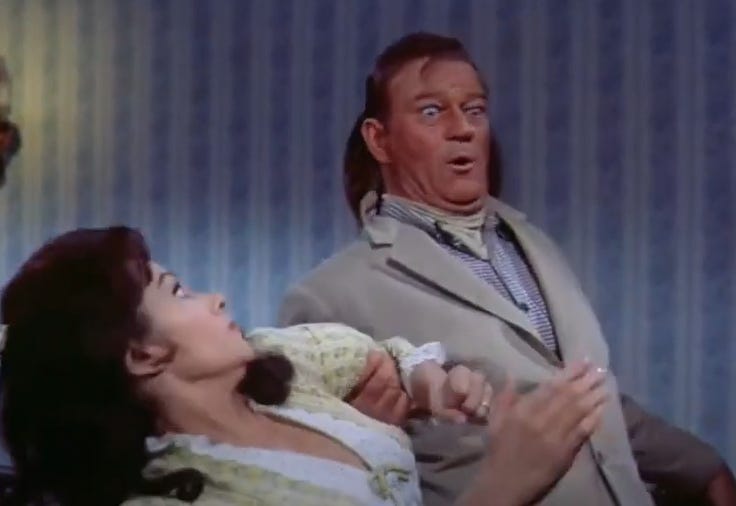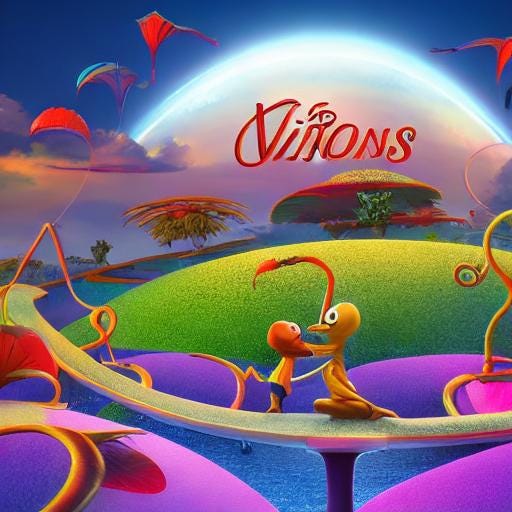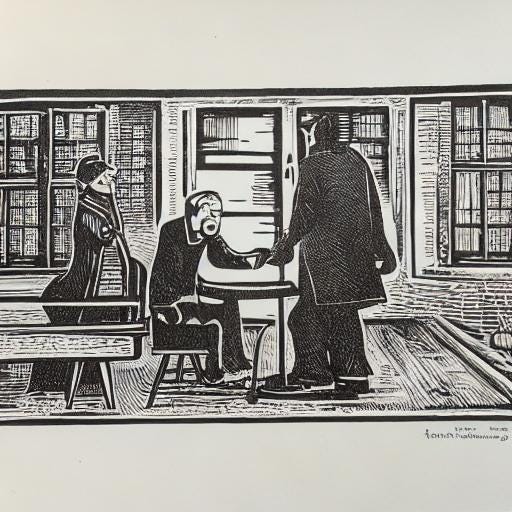The "No Boss" Writing Myth and How a John Wayne Comedy Western Opened My Eyes
"Olly olly oxen free" think too many aspiring writers, lured by the promises of [waves arms] the plethora of personal writing/marketing/branding advice and courses you can find online.

Thanks to John Wayne, I’ve moved on from a limiting belief.
What’s that, Pilgrim? The Duke, you say? Yep. More on that in a bit.
But first I have a complaint.
I keep seeing ads and blog posts revolving around the idea:
Be a writer and be your own boss.
Wrong.
You do have a boss.
The reader.
Over time, hopefully “your” readers.
Thinking you don’t “report” to anyone is a recipe for failure.
One quick caveat here: if you are writing entirely for yourself – for funsies, practice, or self-reflection – carry on. Enjoy improving your craft, or simply scribbling down whatever thoughts pop into your noggin. I’ve done it. It’s liberating. I also discovered that “just writing stuff that didn’t matter” improved my overall work (the stuff I was getting paid for).
Anyway, back to bosses.
True, when you decide to make the switch to writing (of whatever variety) full-time as a solopreneur (egads, I dislike that word), you may be leaving behind a middle-manager assmunch who doesn’t know his ass from a hole in the ground.
That’s great and a huge benefit to your well-being.
But you’re changing one boss for another.
If you want to get paid for the words you write, you need to reframe those visions of FREEEEEEDOOOOMMMMM bouncing around in your noggin.
You also might – like I have in the past – misunderstand what being a writer is. That misunderstanding can harm you professionally.

Visions of Writers Dancing in My Head
For the longest time, my mental image when I heard the word “writer” was (often still is) Stephen King. He has a genius for story. In Billy Summers, he wrote a novella in the voice of the protagonist (one guess on who that is) within the overall novel. It’s been over a year since I read it. Still amazed.
Writers write books. Or long, deep essays for The New Yorker.
These deities sit down and the prose just flows because the talent oozes. After a few months, another book is done. Lather, rinse, repeat.
Of course, writers aren’t pecking out words for a blog or infographic or email campaign or any of the other 1,001 types of content flying around the Internet.
Hopefully, you’re smarter than me and already understand that the label “writer” applies to anyone who seeks meaning through putting words down.
If you do that, you’re a writer (as Ayo Ayodeji helpfully pointed out to me on The Writer’s League).
And there’s so many different kinds of writing – from poetry to copywriting for direct sales (which reminds me of an excellent, free whitepaper on copywriting from Copyblogger; The Killer and the Poet) – that limiting myself that way has been like shackling my brain.
I also had always equated “writing” with “art.” And artists don’t care about money, right?
Well, two examples:
Charles Dickens’ novels were serialized in newspapers so that they would make money. Since it’s almost Christmas time, I doublechecked A Christmas Carol. I didn’t know that Dickens paid to publish the work himself and did well financially from it. From its initial 6,000 copy run in December 1843, the book hasn’t been out of print. Would that any of us create one thing that beloved!
I love the Baltimore Museum of Art. It has the largest collection of Henri Matisse art in the world, at least partially donated by the Cone sisters. They were one of his patrons and he painted works for them.
If you want to go back a few hundred more years, Michelangelo, Bottecelli, and others were sponsored by the Medici family. You can fancy that up by calling it “patronage,” but it’s being paid to create art. Knowing this about art also gives you permission to care about getting paid for your art, but that’s a different post.
Artists don’t want to starve.
Back to John Wayne and bosses.
Everybody Works for Somebody
I’m going to assume if you’re reading this that you haven’t won the lottery or inherited wealth. You work for a living.
Here’s where John Wayne comes in.
This “be your own boss” thing when it comes to copywriting, editing, writing, etc. courses I keep seeing has been rubbing me the wrong way for months.
I couldn’t quite put my finger on why though.
A few days ago I found McLintock while channel surfing, so I watched it again. I love a good Western and McLintock is a favorite. A comedy based on The Taming of the Shrew, John Wayne is the titular character, a wealthy rancher. One scene made me go “A HA!” (literally) about the whole “Bosses?! We don’t need no stinking bosses” (to misquote a different Western).
This is the full movie, but the clip begins at my “A HA!” The transcript is immediately after if you don’t want to watch for 30 seconds.
Drago: Devlin, was you any kind of man you wouldn't let some Dude walk off the prettiest girl West of Denver without a fight!
Dev: I didn’t, Joe. Well what can I do I'm just one of her father's employees. I’m just a hired hand around here.
McLintock: Every so often, Dev, you spill the strangest ideas. Everybody works for somebody. Me, I work for everybody in these United States that steps into a butcher shop for a t-bone steak. And you work for me. Not much difference.
Everybody works for somebody.
When I saw that, the penny finally dropped as to why these promises of freedom irritate me.
The idea that “being free” or “being your own boss” equals “no one to be accountable to.”
If you want to be read, you have to write for someone.
If you want to be paid, you have to write for someone.
While not your “boss,” you are accountable to your reader.
Regardless of your publishing platform, your writing (or art or video or podcast) exists to serve the needs of others. Depending on your niche, that need could be for escape, advice, support, career advancement, etc.
As I write this, I’m still not 100% sure of who my audience is and who I want it to be. I’m working on getting out of my own way by publishing 5 to 7 pieces each week to ingrain a daily writing habit. For instance, this piece of writing could be further fine-tuned by tweaking it to attract a small business owner who needs marketing help, a new writer struggling with the thought of stepping into the arena, or stripped down to a listicle of about 500 words.
I didn’t take any of those approaches because, while I hope this IS helpful to anyone reading it, the equally important personal goal is to get in the habit of publishing as myself. I’ve published a lot of words over the years, but my writing has always been in chunks. Most of my daily work has been spent on non-writing tasks – HubSpot monkey to light design to social media manager to writer outreach to editing to . . . you get the idea.
However, I also know that if I want to make money from my writing, that’s not going to be good enough a year from now. I need both speed AND focus. If I’ve not figured out who my reader is by this time next year, I’ll be
Doing something else OR
Living in one of the boxes I currently have in my basement (they’re good boxes, you never know when you might need one!)
Oddly enough, while I’ve been successful at using content to market companies, I have been shit at doing it for myself. I love Storybrand by Donald Miller so picked up his Business Made Simple a few months ago.
One line has helped me reframe how I see my career. He notes one common trait successful people he speaks with all have:
they view themselves as “an economic product on the open market.”
Your writing has value. It, and you, are an economic product. How well you meet the needs of the “market” (your readers) will decide whether you get to eat because of your writing or because you deliver Uber Eats (been there!).
So Ignore That Endless Parade of Promises
I’ve signed up for two courses in the previous year related to writing;:
The Writers’ League, for basic blocking and tackling and help with structuring a writing career
The Google monster has, of course, noticed and has been serving me up an endless stream of shyte from shysters ever since.
I’ve been promised that if I do this ONE THING (that varies) that my success is GUARANTEED (woohoo, right!) and I’ll never have a boss again.
If you’re a writer, or marketing professional focused on the writing side of marketing (my favorite side), you know what I’m talking about.
These promises are alluring – like the mythical sirens calling sailors to their deaths on the rocks. While you don’t need to put wax in your ears to block out the calls, please ignore any writing or content marketing advice that promises or guarantees success.
The only promise is that it’ll be a grind. And that if you do follow what works you will probably be successful.
It’s all up to you.
Just don’t pretend that you don’t have a boss.
Want to be the boss of me? I’m open to writing, editing, and content marketing (from strategy to execution) work that will help you grow your business. Drop me a line here, at duhonius@gmail.com, or check me out on LinkedIn.






Agree🙌.
Exactly, at the end of the day. we all write for someone! Thanks for actally “reminding” us ! Even though, some writers will say that they don’t wrtite for the public….